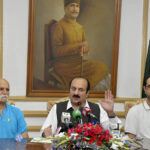ISLAMABAD, Mar 24 (APP):The Supreme Court on Thursday adjourned hearing on the Presidential reference seeking its opinion on Article 63-A of the Constitution till Friday.
A five-member larger bench of the apex court headed by Chief Justic of Pakistan Umar Ata Bandial and comprising Justice Ijaz Ul Ahsan, Justice Muneeb Akhtar, Justice Mazhar Alam Khan Miankhel and Justice Jamal Khan Mandokhel heard the reference and and a petition filed by Supreme Court Bar Association (SCBA) against public gatherings of the opposition and the government in the Federal Capital ahead of the no-confidence motion.
During the course of proceedings, Advocate Raza Rabbani informed the court that he had appealed to become a party in the case.
At this, CJP Bandial told Rabbani to go back to his seat as the court would hear his arguments later.
On the CJP’s directive, Attorney General of Pakistan (AGP) Khalid Jawed Khan read out the apex court’s order issued at the last hearing.
The chief justice asked whether notices should also be issued to the provincial governments.
The AGP said the National Assembly Speaker was also a party in the SCBA’s petition and the court could issue notices to the provinces if it required. The political parties in the provinces were already part of the case, he added.
The court also issued notices to the provincial governments for assistance on the presidential reference.
Discussing the issue of political gatherings in Red Zone, the AGP said the Jamiat Ulema-e-Islam-Fazl and Pakistan Tehreejk-e-Insaf representatives had met the district administration.
The JUI-F, he added, had requested for a sit-in on the Kashmir Highway- the main road that led to the airport and workers of all parties would use it to come to Islamabad. According to the law, everyone was bound to end campaign 48 hours before voting.
The chief justice urged the political parties to stand up for the Constitution.
Justice Ijaz said the purpose of democratic process was not to affect everyday affairs.
Justice Mandokhel asked whether the vote of a Member of the National Assembly (MNA) could be counted in the proceedings before his de-seating. He observed that there was no mention of not counting a vote in the 18th Amendment.
The AGP replied the MNAs elected on a party ticket were bound by the party’s discipline.
The chief justice said the spirit of Article 63-A could not be ignored and it was not the court’s job to fill in the blanks. Such matters should be resolved in the parliament rather than through a reference, he added.
The court had also to look at Article 55 related to quorum and voting in the NA, he added.
Justice Muneeb Akhtar observed that the purpose of Article 63-A was to stop defection from the party’s policies. The party’s collective opinion was above an individual’s opinion, he added.
He said the collective opinion was important for the stability of democracy.
He said one interpretation of Article 63-A was that the vote of dissidents should not be counted. The Constitution empowered the parliamentary party, and not the party’s leader, he added.
Justice Mazhar Alam said nobody could be forced to cast their vote.
Justice Mandokhel recalled that the Balochistan Assembly members had brought a no-confidence motion against their own party’s government.
The AGP said both the opposing groups were from the Balochistan Awami Party (BAP) in that case. Joining hands with the opposition was not the voice of conscience, he said and added that if dissident MNAs were so conscientious, they could resign.
Justice Mandokhel asked what would happen if an MNA returned his seat. A lawmaker also had a vote separate from his party, he added.
The chief justice asked for how long an MNA could be disqualified for and when the process in that regard could begin.
He also asked the AGP to argue as to why the parliament could not settle every matter itself.
The AGP said the system could not work if every MNA acted on his own.
Justice Alam observed that according to Article 63-A(4), cancellation of a party’s membership was tantamount to disqualification. The article concerned was very clear, he added.
The AGP argued that the real issue was about clarifying Article 63-A(4). Someone, who violated the Constitution by defection, could not be praised and it could not read what’s not written in the Constitution. Article 62(1)(f) stated that an MNA should be honest and righteous, he added.
He asked whether a party’s defector should be rewarded, and those, who were dishonest, could be considered righteous.
Justice Mandokhel replied that every MNA had the right to vote in accordance with Article 95, which dealt with the procedure of bringing in a no-confidence motion against the prime minister.
He said if vote could be cast, then it could also be counted. He asked the AGP why the government was seeking the court’s opinion if it already had the answer. If he agreed with this point, then he should withdraw the reference, he added.
The AGP replied that Article 63-A would not be applicable till the MNA voted against the party’s directives.
Justice Ijaz questioned the attorney general about the inquiry the Election Commission of Pakistan (ECP) would conduct based on the party head’s declaration. He asked how the ECP would decide that declaration of defection from the party was correct or not. Whether the ECP’s work would be limited to examine that the procedure was followed.
The AGP replied that defecting from a party discipline could not be correct.
Arguing on the reference at the outset of the hearing, the AGP referred to a 1992 verdict in which the Supreme Court had asked lawmakers to resign if they were troubled by their conscience.
Justice Bandial pointed out that a lot had happened since then.
The AGP replied that a lot happened but loyalties were never changed in the manner as of today. The interviews of defected party members were aired on news channels. According to a past SC decision, if the members who had won the election on the party’s manifesto, changed their allegiance, they should resign.
The chief justice said the verdict was from 1998, to which the AGP responded that he would argue on the basis of the constitutional framework.
Justice Mandokhel observed that Article 63-A was related to the lawmakers’ disqualification.
The AGP said the party head could not issue a declaration in that regard as there were relevant forums for it.
He said the members were bound to follow party directives under Article 63-A of the Constitution. He said it was also applicable to voting on the prime minister’s election and the no-confidence vote. The Constitution contained the procedure for the disqualification of parliamentarians, he added.
He said Articles 62, 63 and 63-A could not be read separately. The court had already declared the parliamentary system as the basic structure of the Constitution, he added.
The AGP said the political parties were foundation of the party system. The court had made an observation regarding deviation from the party’s policy in the past. The court had remarked if the members of Muslim League had contested elections independently then Pakistan would not have been formed.
He contended that Articles 62 and 63 were categorised in the same section of the Constitution, while Article 19 gave every person complete freedom of expression.
Justice Ijaz said the attorney general was in fact talking about the difference between the voting rights of a member of the assembly and a common man.
The AGP responded that a vote cast by a member of the parliament could not be undone as Article 17(2) encouraged voting on party lines rather than in an individual capacity. In the parliamentary system of governance, an individual political party’s legislation had no importance, he added.
Justice Mandokhel observed that the right to vote was granted to an individual and not to the party.
Justice Muneeb Akhtar remarked that voting against the policy of a political party weakened the system.
The chief justice remarked that observation given in a court’s decision was very important.
The AGP said the public’s mandate was represented in the parliament in a collective form and political parties legislated for them.
Justice Mandokhel said the right to vote was granted to parliamentarians and not party members.
Justice Ijaz said Article 63-A had been introduced to ensure discipline within the party.
Justice Muneeb Akhtar observed that political parties were institutions that were weakened by disciplinary violations. If the party line was not adhered to, the political party would be destroyed, he added.
The AGP said the Supreme Court had also previously adjudged that the political parties were institutions.
Justice Muneeb said that the democratic system was weakened if the political party was not strong.
The AGP said despite the presidential system in the United States, a senator was not independent there.
Justice Mandokhel asked what was the difference between someone winning the election on a political party’s ticket and an independent member of the National Assembly.
The AGP said the independent member did not accept the party’s manifesto, he should resign. The ship could not be changed after 2.5 years in a five-year assembly tenure, he added.
The chief justice asked the AGP whether he was asking the court for life-time disqualification of dissident MNAs.
Justice Ijaz said the incumbent government had a very thin majority and asked whether the dissident MNAs would jump the ship after drowning the first party.
Justice Muneeb Akhtar observed that Article 63-A directed the lawmakers to vote in accordance with party lines without looking on good or evil. It was the real problem and the members going in different directions would cause chaos.
Justice Mandokhel questioned whether the AGP wanted to make the party head equivalent to a king. The AGP responded in negative and said the government did not want the party head to become a turncoat either.
The chief justice asked whether a lawmaker had the right to decide against party lines.
Justice Ijaz also asked whether the government could be toppled by its members jumping the ship. Most of the democratic governments were formed by the majority of a few votes.
Justice Muneeb observed that even ordinary legislation would not be done if members continued to jump across the party lines.
The AGP said the matter was not limited to Article 63-A but to the possible failure of the entire system. If everyone did what they wanted, the political party would become a crowd rather than an institution, and making individuals powerful destroyed the institutions, he added.
Discussing the Sindh House matter, the Advocate General Sindh said the provincial government was satisfied over the action taken by the district administration. The police had recorded the statement of the provincial government on the incident.
The court directed the IGP Islamabad to take action on the matter in accordance with law.
Advocate Farooq H Naek said that the court would have to interpret the Constitution.
The chief justice asked Farooq Naek to not link the court proceedings to the assembly sessions.






